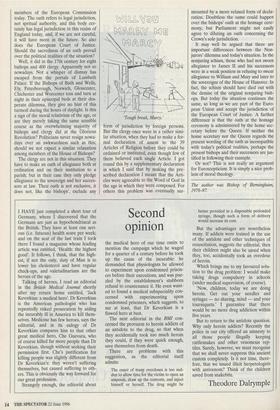Second opinion
I HAVE just completed a short tour of Germany, where I discovered that the Germans are just as hypochondriacal as the British. They have at least one seri- ous (i.e. fatuous) health scare per week; and on the seat of the last train I took there I found a magazine whose leading article was entitled, 'Health: the highest good'. It follows, I think, that the high- est, if not the only, duty of Man is to lower his cholesterol and have regular check-ups, and valetudinarians are the heroes of the age.
Talking of heroes, I read an editorial in the British Medical Journal shortly after my return home entitled, 'Jack Kevorkian: a medical hero'. Dr Kevorkian is the American pathologist who has repeatedly risked prosecution by aiding the incurably ill in America to kill them- selves. Medicine has few heroes, says the editorial, and in its eulogy of Dr Kevorkian compares him to that other great medical hero, Che Guevara, who of course killed far more people than Dr Kevorkian, though without seeking their permission first. Che's justification for killing people was slightly different from Dr Kevorkian's: they weren't suffering themselves, but caused suffering to oth- ers. This is obviously the way forward for our great profession.
Strangely enough, the editorial about the medical hero of our time omits to mention the campaign which he waged for a quarter of a century before he took up the cause of the incurable: he demanded that physiologists be allowed to experiment upon condemned prison- ers before their executions, and was puz- zled by the establishment's stubborn refusal to countenance it. He even want- ed to found a medical subspeciality con- cerned with experimenting upon condemned prisoners, which suggests, to me at least, that Dr Kevorkian is a flawed hero at best.
The next editorial in the BMJ con- cerned the provision to heroin addicts of an antidote to the drug, so that when they accidentally took too much heroin they could, if they were quick enough, save themselves from death.
There are problems with this suggestion, as the editorial itself admits:
The onset of many overdoses is too sud- den to allow time for the victim to open an ampoule, draw up the contents, and inject himself or herself. The drug might be better provided in a disposable preloaded syringe, though such a form of delivery would increase its cost.
But the advantages are nonetheless many. If addicts were trained in the use of the antidote and other techniques of resuscitation, suggests the editorial, then their children might also be saved when they, too, accidentally took an overdose of heroin.
Which brings me to my favoured solu- tion to the drug problem: I would make taking drugs compulsory in schools (under medical supervision, of course).
`Now, children, today we are doing heroin. Get out your needles and syringes — no sharing, mind — and your tourniquets.' I guarantee that there would be no more drug addiction within five years.
But to return to the antidote question. Why only heroin addicts? Recently the police in our city offered an amnesty to all those people illegally keeping rattlesnakes and other venomous rep- tiles. Surely, however, we must recognise that we shall. never suppress this ancient custom completely. Is it not time, there- fore, that we issued illicit herpetologists with antivenom? Think of the children saved from snakebite.
Theodore Dalrymple


























































 Previous page
Previous page